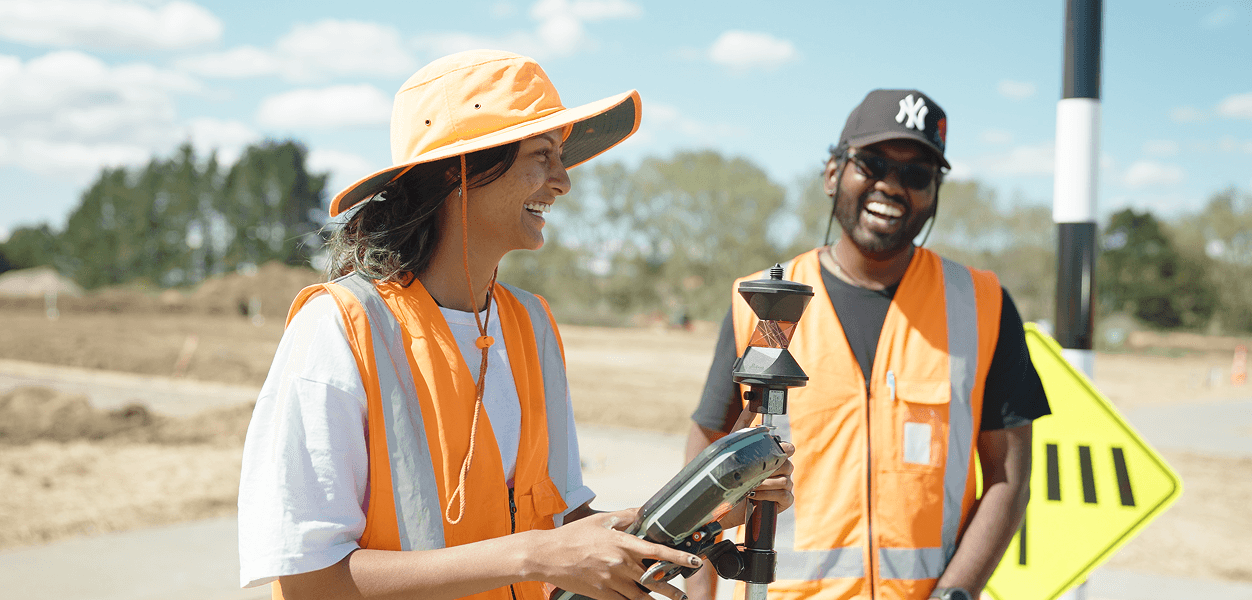
Founded in 1970, Woods has built decades of expertise and proprietary knowledge across land development and civil engineering, urban design and planning, water modelling and infrastructure, surveying and geospatial services.
We have a reputation for delivering comprehensive, innovative, and cost-effective solutions for complex projects.


Over 55 years, we’ve built a strong culture—one we now recognise as the key to our success. We attract talented, committed people who naturally embrace The Woods Way because it aligns with their values.
They’re smart, pragmatic, and action-oriented and they thrive on complex challenges and take pride in delivering quality results. Most importantly, they’re driven by a shared purpose: to create a better New Zealand for Kiwis today and into the future.





We always go above and beyond for clients. We select the best people for each project, support them with leading technology, and ensure they remain on the job until it is done.

We take a holistic approach ensuring everyone involved on a project – us, our clients and their stakeholders – collaborate effectively to get the best possible outcome.

We are warm, humble and pragmatic. We give straightforward practical advice, which gives our clients the clarity and confidence they need to move forward.

We are problem solvers, outcome focused and can always be relied on to get the job done – on time, budget and to the quality required.
The Woods story is very Kiwi, organic and unplanned. It’s about survival and “never giving up”, being innovative, and going above and beyond. Most of all though, it is about people.
Over 50 years ago, two Kiwi brothers – a surveyor and an engineer – decided to start a company. Sharing a pre-First World War cottage with an architect, they got stuck into projects across Auckland.
With a “never give up” attitude, Woods survived multiple chances to fold. Instead, unassumingly, we got on with the job – solved problems, delivered projects, and left our mark across Auckland and New Zealand.

When life looked vastly different in 1970 to what we know now, two brothers named Don and Antony (Tony) Wood took a chance and established the company under the name DL & AW Wood at 72 Grafton Road, Auckland.
With three extra team members on board – John Locke, Graham Rice, and Laurie Edmond – the team experienced their first hurdle when the oil shock recessions impacted Kiwi shores.
The Woods team temporarily split and fragmented around the world to work. Hello Fiji and Egypt.

The industry in New Zealand slowly got underway again with new large scale land development projects.
Tim James joined Woods in 1982 and took over new work from Don in the late 80s, while Don continued his close working relationship with Manukau City Council.
Woods was heavily impacted as developers shut down during the stock market crash in 1987.

For Woods, entering the 1990s saw a challenging period of changes within the business, alongside the grind off the back of the '87 stock market crash.
Daniel Williams, Mark Williams and Mark Cochrane joined Woods as business began to rise.
Woods acted as an integral partner in the construction and development of Dannemora in East Auckland, one of New Zealand's largest residential developments at the time.
Woods played a lead role in the Gulf Harbour project, which established the first marina development in Auckland and the first canal houses in the country.

In conjunction with the Asian Financial Crisis, Y2K became a pain point for Woods. The Y2K hysteria may have been quick to settle, but uncertainty and caution remained.
After a hugely successful career, Don retired from Woods in 2004. With his many years of service on the NZ Survey Board, he was made a Fellow of the Surveyors Institute and continued as a consultant until 2013.
Woods became lead consultants for the Long Bay, Stonefields, Millwater, Albany Town Centre, and Pegasus Town developments.
Despite the chaos of the Global Financial Crisis, our resilience enabled us to open our Christchurch office in 2008 to better support the Pegasus Town development.

In the '10s, things started to really pick up for Woods, with the team refining and improving their services, moving into different technologies, and launching a new planning and urban design offering.
The Christchurch earthquakes in 2011 changed Kiwi lives forever. Liquification massively impacted the city and many buildings were brought down. Following the quakes, one of Woods’ main projects was SCIRT survey and engineering work.
We were awarded lead consultancy roles for Millwater’s sister development, Milldale, in 2017, and Paerata Rise in 2016
In 2017 and 2018 Woods was selected out of 123 businesses as winner of the Aon Hewitt Best Employer Award.
In 2018, our work with HLC to redevelop state housing morphed into the Piritahi alliance, later called the LEAD Alliance.

Having gone through multiple recessions and hard lessons over the years, our resilient culture allowed us to withstand the challenges of the COVID pandemic and continue on our growth trajectory.
After our 50th birthday, we appointed our first CEO, David Kidd.
In 2024, we acquired the geospatial survey business from Data Collection Limited (DCL) and AR & Associates
Kiwi Property appointed us as engineering lead for the Dury East Development.
Our geospatial team developed two innovative new solutions to support and enhance data collection and analysis; Woods Map and GeoTrack.
-7o1d078yti.jpg&w=3840&q=75)






Woods is externally audited by BDO